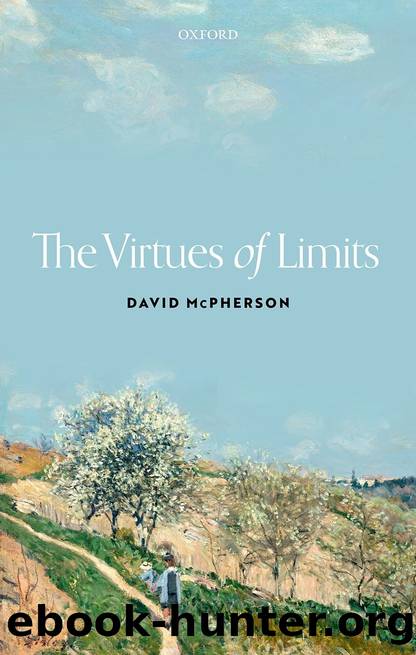The Virtues of Limits by David McPherson

Author:David McPherson [McPherson, David]
Language: eng
Format: epub
ISBN: 9780192664679
Publisher: OUP Oxford
Published: 2021-11-13T00:00:00+00:00
Sufficientarian Justice
I want to make the case for a sufficientarian conception of distributive justice, which I will contrast with and defend against a common egalitarian conception known as âluck egalitarianism.â The basic sufficientarian claim is that what matters with regard to distributive justice is, as Harry Frankfurt puts it, ânot that everyone should have the same but that each should have enough,â21 where what counts as âenough,â on my view, is that each person can live and live well in a characteristically human mode of life, and where addressing dire human need is of paramount importance.22 Indeed, many times when people say they are concerned with inequality, it seems that what they are really concerned with is poverty, that is, that people do not have enough. After all, it does not seem important that two wealthy people have the same amount of resources, but it is important that everyone has enough to live well.
It should be noted up front that although I reject luck egalitarianism as the right form of distributive justice, I do affirm moral egalitarianism, which maintains that all human beings in virtue of being human possess the same basic intrinsic dignity, and which is also connected to a relational egalitarianism where we treat other human beings as our equals with respect to basic dignity. Such moral and relational egalitarianism, I maintain, does not require that everyone should have the same material conditions, but it does require that everyone should have enough, since to disregard dire human need is to disregard human dignity. Where one cannot meet this need for oneself, the obligation falls to others, especially the political community, which I suggested should be understood as in part constituted for this purpose. Beyond meeting dire need, we should also seek to promote a broad âequality of conditionâ (rather than equality of outcome), which Tocqueville thought was the characteristic condition of genuinely democratic societies.23 As Sandel describes it, such equality of condition âenables those who do not achieve great wealth or prestigious positions to live lives of decency and dignityâdeveloping and exercising their abilities in work that wins social esteem, sharing in a widely diffused culture of learning, and deliberating with their fellow citizens about public affairs.â24
With these preliminary remarks now complete, let us now examine luck egalitarianism as the major egalitarian rival to sufficientarianism. Luck egalitarianism finds a prominent supporter in G. A. Cohen, whose essay âRescuing Conservatism: A Defense of Existing Valueâ I drew on in Chapter 1 in articulating the importance of an accepting-appreciating stance toward the given world. I will argue that luck egalitarianism is in fact at odds with a proper accepting-appreciating stance toward the given, since, as David Wiggins puts it, it wages âa metaphysical crusade against contingency.â25 By contrast, sufficientarianism does not have this problem, and this is an important reason in its favor, as I will return to discuss.
In his essay âOn the Currency of Egalitarian Justice,â Cohen expresses the basic idea of luck egalitarianism when he writes: âa large
Download
This site does not store any files on its server. We only index and link to content provided by other sites. Please contact the content providers to delete copyright contents if any and email us, we'll remove relevant links or contents immediately.
The remains of the day by Kazuo Ishiguro(8999)
Tools of Titans by Timothy Ferriss(8396)
Giovanni's Room by James Baldwin(7346)
The Black Swan by Nassim Nicholas Taleb(7129)
Inner Engineering: A Yogi's Guide to Joy by Sadhguru(6796)
The Way of Zen by Alan W. Watts(6614)
The Power of Now: A Guide to Spiritual Enlightenment by Eckhart Tolle(5782)
Asking the Right Questions: A Guide to Critical Thinking by M. Neil Browne & Stuart M. Keeley(5775)
The Six Wives Of Henry VIII (WOMEN IN HISTORY) by Fraser Antonia(5515)
Astrophysics for People in a Hurry by Neil DeGrasse Tyson(5190)
Housekeeping by Marilynne Robinson(4447)
12 Rules for Life by Jordan B. Peterson(4304)
Ikigai by Héctor García & Francesc Miralles(4274)
Double Down (Diary of a Wimpy Kid Book 11) by Jeff Kinney(4272)
The Ethical Slut by Janet W. Hardy(4253)
Skin in the Game by Nassim Nicholas Taleb(4249)
The Art of Happiness by The Dalai Lama(4130)
Skin in the Game: Hidden Asymmetries in Daily Life by Nassim Nicholas Taleb(4007)
Walking by Henry David Thoreau(3962)
